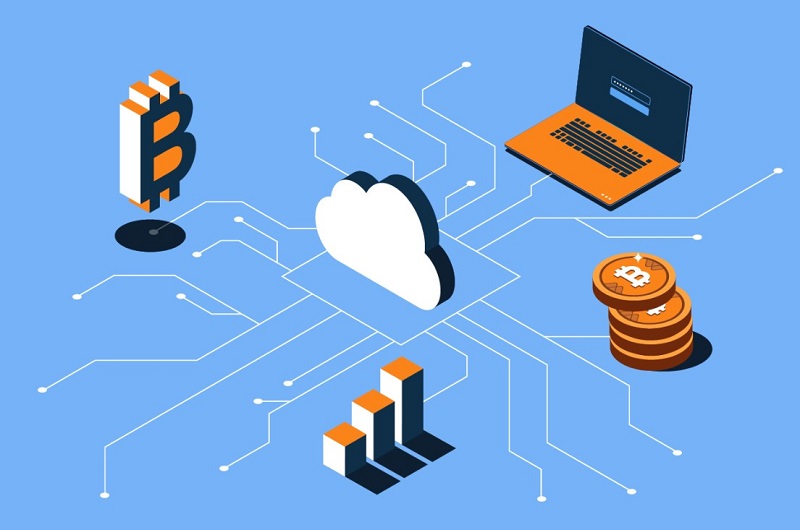As the popularity of cryptocurrency continues to surge, more and more people are looking for ways to get involved in the mining process. Traditionally, mining required a significant investment in hardware, software, and electricity. However, cloud hosting has emerged as a viable alternative for those who don’t want to commit to purchasing and managing their own equipment.
Today, medCPU will explore the benefits and drawbacks of cloud hosting for crypto mining, including the option to rent bitcoin mining server. While there are certainly advantages to this approach, it’s important to understand the potential pitfalls before diving in headfirst.
Benefits of cloud hosting for crypto mining
One of the main advantages of cloud hosting for crypto mining is the lower upfront costs. Rather than investing in expensive hardware, software, and electricity, miners can simply rent computing power from a cloud hosting provider. This can be particularly appealing to those who are new to mining or who don’t have the financial resources to make a large upfront investment.
Another benefit is the scalability of cloud hosting. Miners can easily add or remove computing power as their needs change, without having to worry about purchasing new equipment or selling off old hardware. And finally, cloud hosting offers the convenience of not having to manage hardware, maintenance, or upgrades. This can be a major time-saver for busy miners who want to focus on the mining process itself, rather than the technical aspects of managing their equipment.

Drawbacks of cloud hosting for crypto mining
While cloud hosting for crypto mining has its benefits, there are also significant drawbacks to consider. One major drawback is the lack of control that miners have over the hardware, software, and configuration. Because the equipment is owned and managed by the cloud hosting provider, miners have limited ability to make changes or optimizations that could improve their mining efficiency.
Another drawback is the limited profitability. Cloud hosting providers typically take a cut of the profits, reducing the overall returns for miners. This means that miners may not earn as much as they would if they were managing their own equipment.
And finally, cloud hosting poses security risks due to the centralization of mining power. A large portion of the mining process is controlled by a single entity, making the system vulnerable to attacks or hacks. This can be particularly concerning for those who value decentralization and security in the cryptocurrency ecosystem.
Case study: a comparison of cloud hosting vs. traditional mining
To better understand the pros and cons of cloud hosting for crypto mining, it’s helpful to compare it to traditional mining. Traditional mining involves purchasing and managing your own hardware and software, as well as paying for electricity and maintenance costs. In contrast, cloud hosting allows miners to rent computing power and avoid the upfront costs associated with purchasing their own equipment.
A detailed comparison of the costs, profitability, and risks of these two approaches can help miners make an informed decision about which option is best for them. In addition, real-world examples and experiences from miners who have tried both approaches can provide valuable insight into the pros and cons of each. By weighing the costs and benefits of cloud hosting vs. traditional mining, miners can choose the approach that makes the most sense for their specific circumstances and goals.

Best practices for using cloud hosting for crypto mining
For those who decide to use cloud hosting for crypto mining, there are several best practices to keep in mind.
- First and foremost, it’s crucial to select a reliable and trustworthy cloud hosting provider. This can help minimize the risks associated with cloud hosting, such as security vulnerabilities and lower profitability.
- Additionally, miners should aim to maximize their profitability by carefully managing their mining strategies and minimizing costs wherever possible. This can include selecting the most profitable coins to mine, optimizing mining software and configurations, and reducing unnecessary expenses.
- Finally, it’s important to remember that cloud hosting should be just one part of a larger mining operation. By diversifying their mining strategies and using a variety of different approaches, miners can reduce their overall risk and increase their chances of success.
With the right approach, cloud hosting can be a valuable tool for crypto miners looking to enter the market or expand their existing operations.
Conclusion
In conclusion, cloud hosting for crypto mining has both benefits and drawbacks that miners should carefully consider. While cloud hosting can offer lower upfront costs, scalability, and convenience, it also comes with limitations on control, reduced profitability, and security risks. When compared to traditional mining, cloud hosting can be a viable alternative for some miners, but it’s important to weigh the costs and benefits and make an informed decision.
Looking ahead, cloud hosting is likely to continue playing a role in the future of cryptocurrency mining, as more miners seek to enter the market and expand their operations.
Ultimately, the decision to use cloud hosting for crypto mining will depend on a range of factors, including individual preferences, financial resources, and long-term goals.
We encourage readers to share their own experiences and perspectives on this topic and to continue exploring the many opportunities and challenges presented by the world of cryptocurrency mining.

Eyal Ephrat serves as the co-founder and CEO of medCPU.com, where technology is making significant strides in the field of medicine. Through his experience in purchasing PC and laptop equipment and various other tech products, Eyal Ephrat contributes valuable insights to medCPU’s mission.
